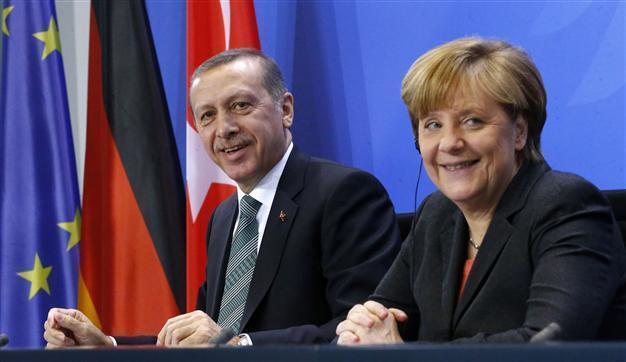Local elections will be crucial test for AKP: Turkish PM Erdoğan
BERLIN

German Chancellor Angela Merkel and Turkey's Prime Minister Tayyip Erdogan address the media after talks in Berlin Feb 4. REUTERS photo
Prime Minister Recep Tayyip Erdoğan has identified the upcoming local elections on March 30 as a crucial test for the ruling Justice and Development Party (AKP), speaking on his official visit to Germany on Feb. 4.
Erdoğan defended his government’s economic record in the last decade amid the ongoing corruption probe, saying that if the allegations were true, the Turkish economy would not have been able to blossom during his party’s rule since 2002.
“The national income increased from $230 billion to $800 billion. Exports rose from $36 billion to $152 billion. Can a corrupt country or a government achieve this? We are here because there are no such things,” hesaid, responding to reporters’ questions after a conference at the German Council on Foreign Relations.
“We are here because we fought corruption, poverty and prohibitions. We had three general elections, two local elections, two referendums and we have come through all those. Now there is an election on March 30 and the real test is this. If the people choose us as the top party, that means this government is honest,” the prime minister said.
Erdoğan echoed his comments after a meeting with Chancellor Angela Merkel in Berlin. “The point of the election is not who will be elected mayor or not, but which party will get how many votes. This is the reflection in Turkey. I can say this is a test,” Erdoğan told reporters standing along with Merkel.
For her part, Merkel prodded Turkey over judicial independence, which has been called into question by Ankara’s handling of the corruption scandal. She said she and Erdoğan agreed to have their justice ministers discuss issues such as the appointment of prosecutors and judges, as well as judicial independence in general.
Asked whether she thought the intensity of the discussion about an independent judiciary in Turkey would have been as high if EU accession chapters had been opened previously, Merkel said every country should solve its problems internally, adding that she supported advancing talks on Turkey’s membership.
At the same time, however, she added that she remained skeptical about whether Turkey should join,
while also refusing to put a timeline on the end process.
“Every country must follow its own path to democracy [relying upon] its inner strength,” she said, adding that Germany continued to follow developments and would continue to express its opinion about policies that went against EU principles, as it had with the police crackdowns on Gezi protesters.
Merkel lends support for accession processMerkel said she supported opening those sections of Turkey’s membership negotiations that address justice and human rights “as soon as possible.”
“We will move forward step by step. It is no secret, and nothing has changed in my position, that I am rather skeptical about full membership for Turkey,” she said. “But that doesn’t need to bother us at this point.”
Prior to his talks with Merkel, Erdoğan urged Germany to step up support for Turkey’s EU bid but acknowledged his country must also press on with reforms. “We expect and would like also to receive support from Germany for the path into the EU and the EU admission process,” Erdoğan told the German Council on Foreign Relations. “We would like for Germany to campaign [for it] more strongly than it has up until now.”
The two also discussed bilateral ties and the Syrian crisis. Merkel praised Turkey’s contribution to the Syria refugee crisis, noting that it is now hosting 700,000 Syrians. Merkel called the situation in Syria “intolerable,” while calling for talks with Russia and China to help solve the conflict.
